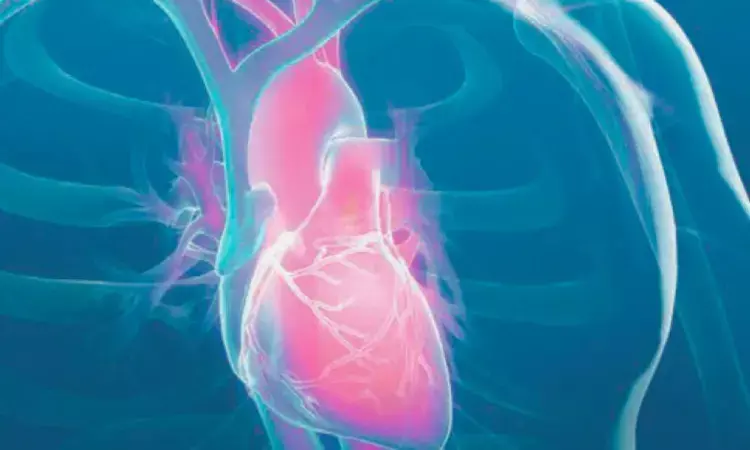- Home
- Medical news & Guidelines
- Anesthesiology
- Cardiology and CTVS
- Critical Care
- Dentistry
- Dermatology
- Diabetes and Endocrinology
- ENT
- Gastroenterology
- Medicine
- Nephrology
- Neurology
- Obstretics-Gynaecology
- Oncology
- Ophthalmology
- Orthopaedics
- Pediatrics-Neonatology
- Psychiatry
- Pulmonology
- Radiology
- Surgery
- Urology
- Laboratory Medicine
- Diet
- Nursing
- Paramedical
- Physiotherapy
- Health news
- Fact Check
- Bone Health Fact Check
- Brain Health Fact Check
- Cancer Related Fact Check
- Child Care Fact Check
- Dental and oral health fact check
- Diabetes and metabolic health fact check
- Diet and Nutrition Fact Check
- Eye and ENT Care Fact Check
- Fitness fact check
- Gut health fact check
- Heart health fact check
- Kidney health fact check
- Medical education fact check
- Men's health fact check
- Respiratory fact check
- Skin and hair care fact check
- Vaccine and Immunization fact check
- Women's health fact check
- AYUSH
- State News
- Andaman and Nicobar Islands
- Andhra Pradesh
- Arunachal Pradesh
- Assam
- Bihar
- Chandigarh
- Chattisgarh
- Dadra and Nagar Haveli
- Daman and Diu
- Delhi
- Goa
- Gujarat
- Haryana
- Himachal Pradesh
- Jammu & Kashmir
- Jharkhand
- Karnataka
- Kerala
- Ladakh
- Lakshadweep
- Madhya Pradesh
- Maharashtra
- Manipur
- Meghalaya
- Mizoram
- Nagaland
- Odisha
- Puducherry
- Punjab
- Rajasthan
- Sikkim
- Tamil Nadu
- Telangana
- Tripura
- Uttar Pradesh
- Uttrakhand
- West Bengal
- Medical Education
- Industry
PCSK9 Antibodies Show Promise in Reducing Coronary Plaque in Statin-Treated Patients

China: A recent meta-analysis published in the International Journal Of Cardiology by Sen Liu and colleagues has shed light on the potential benefits of PCSK9 antibodies in combination with high-density statins for patients with coronary artery disease (CAD). The study aimed to uncover the reasons behind the observed cardiovascular benefits associated with PCSK9 antibodies and their impact on coronary plaque in statin-treated CAD patients.
Researchers conducted a comprehensive search of PubMed, Embase, and the Cochrane Library, covering studies from inception to February 1, 2023. They included randomized controlled trials (RCTs) and nonrandomized studies that explored the relationship between PCSK9 antibodies and coronary plaque regression and stabilization, as assessed by intravascular imaging, in CAD patients on statin therapy.
A total of nine studies, comprising seven RCTs and two non-RCTs, involving 2290 CAD patients were identified and included in the analysis.
IVUS-Derived Percent Atheroma Volume (PAV): In statin-treated CAD patients, the addition of PCSK9 antibodies was associated with a significant reduction in PAV (mean difference [MD], -1.26).
Total Atheroma Volume (TAV): Similar to PAV, the combination therapy resulted in a reduction in TAV (MD, -7.23).
Incidence of PAV Regression: The addition of PCSK9 antibodies increased the odds of PAV regression (odds ratio [OR], 2.24).
Incidence of TAV Regression: Patients receiving both PCSK9 antibodies and statins had a higher chance of TAV regression (OR, 1.66).
OCT-Derived Minimum Fibrous Cap Thickness (FCT): In this aspect, the combination therapy led to a notable increase in FCT (MD, 25.16).
Incidence of Thin-Capped Fibroatheroma (TCFA) Regression: The odds of TCFA regression were also significantly higher with PCSK9 antibody treatment (OR, 2.56).
Maximum Lipid Arc: The combination therapy resulted in a decrease in the maximum lipid arc (MD, -14.96).
Interestingly, these positive effects were predominantly observed in Caucasian patients from multiple countries. However, further research is needed to assess the impact of PCSK9 antibodies on Asian patients with CAD.
In conclusion, the meta-analysis suggests that the addition of PCSK9 antibodies to statin therapy can lead to significant regression and stabilization of coronary plaque in CAD patients, particularly in the Caucasian population. These findings highlight the potential of PCSK9 antibodies as a valuable treatment option for CAD, though further investigations are required to determine their efficacy in Asian patients.
Reference:
Sen Liu ,Peijian Wang, Cheng Liu ,Menglong Jin,Jindong Wan,Jixin Hou,Yi Yang,Dan Wang,Ziyang Liu,Zhenyan Fu Effect of PCSK9 antibodies on coronary plaque regression and stabilization derived from intravascular imaging in patients with coronary artery disease: A meta-analysis.
Dr Kamal Kant Kohli-MBBS, DTCD- a chest specialist with more than 30 years of practice and a flair for writing clinical articles, Dr Kamal Kant Kohli joined Medical Dialogues as a Chief Editor of Medical News. Besides writing articles, as an editor, he proofreads and verifies all the medical content published on Medical Dialogues including those coming from journals, studies,medical conferences,guidelines etc. Email: drkohli@medicaldialogues.in. Contact no. 011-43720751


